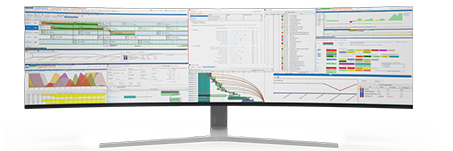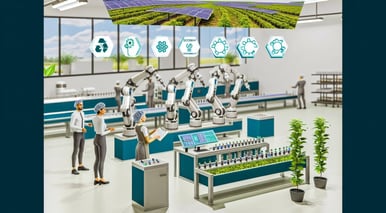HUMAN-CENTRIC APPROACHES TO SUSTAINABLE PHARMACEUTICAL MANUFACTURING
Operations Directors face the challenge of balancing efficiency, compliance, and sustainability in pharmaceutical manufacturing. The pharmaceutical industry has seen a paradigm shift towards sustainable practices, and it is imperative for manufacturing facilities to adopt human-centric approaches to address these concerns.
This blog explores the integration of advanced planning tools like PlanetTogether with prominent ERP, SCM, and MES systems, such as SAP, Oracle, Microsoft, Kinaxis, and Aveva, to create a synergistic ecosystem that fosters sustainable and efficient pharmaceutical manufacturing.

The Evolution of Sustainable Manufacturing
As the pharmaceutical industry increasingly embraces sustainable practices, the role of Operations Directors becomes pivotal in aligning production processes with environmental and social responsibility. Traditional manufacturing models are being reevaluated to incorporate human-centric approaches that not only prioritize environmental sustainability but also focus on the well-being and engagement of the workforce.
Human-Centric Manufacturing
Human-centric manufacturing emphasizes the role of employees in the production process. It acknowledges the importance of creating a work environment that promotes employee well-being, engagement, and growth. Integrating this approach into pharmaceutical manufacturing is essential for fostering a culture of sustainability, efficiency, and innovation.


The Crucial Role of Advanced Planning Tools
To implement human-centric manufacturing successfully, Operations Directors must leverage advanced planning tools. PlanetTogether, a cutting-edge advanced planning and scheduling (APS) solution, stands out as a key player in optimizing production processes. Its ability to integrate seamlessly with ERP, SCM, and MES systems makes it an ideal choice for enhancing the overall efficiency of pharmaceutical manufacturing facilities.
Integration with ERP Systems
Enterprise Resource Planning (ERP) systems like SAP, Oracle, and Microsoft play a central role in streamlining business processes. Integrating PlanetTogether with these ERP systems creates a unified platform, ensuring real-time visibility into production schedules, resource allocation, and inventory management. This integration facilitates data-driven decision-making, reducing operational bottlenecks and enhancing overall efficiency.
Synergizing with SCM Systems
Supply Chain Management (SCM) systems are crucial for pharmaceutical manufacturers to ensure the seamless flow of materials and information. By integrating PlanetTogether with SCM systems, Operations Directors can achieve better demand forecasting, optimized inventory levels, and improved collaboration with suppliers. This not only enhances operational efficiency but also contributes to sustainability by minimizing waste and reducing lead times.
Maximizing MES Integration
Manufacturing Execution Systems (MES) are vital for tracking and controlling production processes on the shop floor. Integrating PlanetTogether with MES systems enhances real-time monitoring, allowing Operations Directors to make informed decisions promptly. This integration leads to improved production visibility, reduced downtime, and increased overall equipment efficiency (OEE), contributing to a more sustainable manufacturing environment.
Kinaxis and Aveva Integration
In addition to industry giants like SAP, Oracle, and Microsoft, integrating PlanetTogether with specialized solutions like Kinaxis and Aveva further enhances the capabilities of pharmaceutical manufacturing facilities. Kinaxis RapidResponse brings agility to supply chain planning, ensuring quick response to changing market dynamics. Aveva's comprehensive Manufacturing Execution System complements PlanetTogether, providing a robust foundation for human-centric, sustainable manufacturing practices.

Achieving Sustainability Through Optimization
The integration of advanced planning tools with ERP, SCM, and MES systems creates a holistic approach to sustainable pharmaceutical manufacturing. Operations Directors can leverage these synergies to optimize production processes, reduce waste, and minimize environmental impact. This not only aligns with global sustainability goals but also positions the manufacturing facility as a socially responsible player in the industry.
Employee Engagement and Well-being
Human-centric manufacturing goes beyond optimizing processes; it focuses on the well-being and engagement of the workforce. Operations Directors should actively involve employees in the decision-making process, fostering a culture of collaboration and innovation. By creating a positive work environment, companies can attract and retain top talent, ultimately contributing to the success of sustainable manufacturing practices.
Overcoming Challenges in Implementation
While the benefits of integrating advanced planning tools with ERP, SCM, and MES systems are evident, the implementation process poses its own set of challenges. Operations Directors must address issues related to data migration, system compatibility, and employee training to ensure a smooth transition. However, the long-term advantages of a well-integrated system far outweigh the initial challenges.
Adopting human-centric approaches to sustainable pharmaceutical manufacturing requires a strategic blend of advanced planning tools and seamless integration with ERP, SCM, and MES systems. Operations Directors play a pivotal role in steering their facilities towards a future where efficiency, sustainability, and employee well-being coexist harmoniously.
By embracing these human-centric principles and leveraging technologies like PlanetTogether, pharmaceutical manufacturing facilities can not only meet current industry standards but also lead the way in shaping a more sustainable and socially responsible future.


